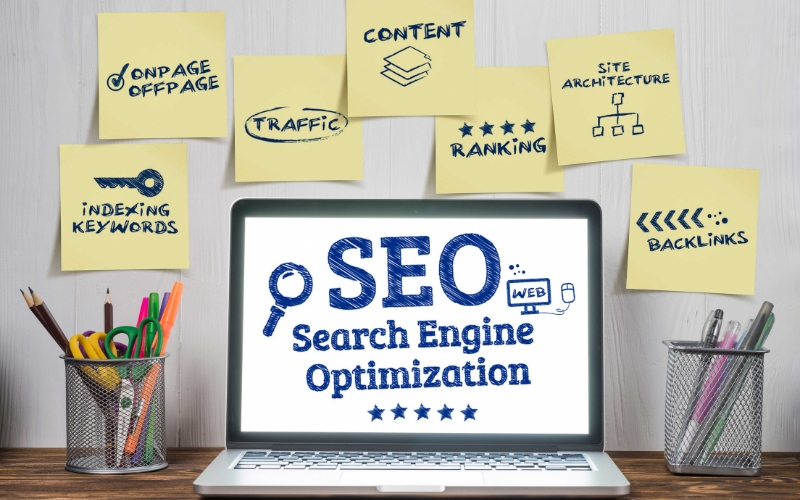
Optimizing your website for SEO on a budget is essential for small businesses looking to improve their online presence without breaking the bank. Small business SEO strategies don’t have to be costly to be effective. With a combination of simple and affordable techniques, even businesses with limited resources can significantly boost their search engine rankings, attract more visitors, and ultimately increase conversions. Whether it’s enhancing the website’s load speed or ensuring mobile-friendliness, there are several key areas to focus on for maximizing SEO results while minimizing expenses.
Optimizing Your Website for SEO on a Budget

Optimizing your website for SEO on a budget is crucial for small businesses aiming to increase their online visibility without spending a fortune. Small business SEO can be a game-changer, but it doesn’t always require a hefty marketing budget. In fact, there are several cost-effective strategies that can significantly improve your website’s SEO and drive more organic traffic, all while staying within a budget.
One of the most important aspects of small business SEO is improving your website’s load speed. Slow-loading pages can harm your user experience, which directly impacts bounce rates and, ultimately, your search engine rankings. Google uses page speed as a ranking factor, meaning a fast website can give your small business an SEO boost. You don’t need expensive tools to improve this; simply compressing images, using browser caching, and optimizing your site’s code can lead to faster load times. There are free online tools like Google PageSpeed Insights that help identify performance issues, allowing you to fix them without hiring a developer.
Another vital aspect of small business SEO is mobile optimization. With more users browsing the web on mobile devices, ensuring your website is mobile-friendly is no longer optional. Google also uses mobile-first indexing, which means it prioritizes the mobile version of your site for rankings. To improve your mobile SEO without breaking the bank, you can opt for responsive design templates, which adjust your website layout according to the screen size, offering a seamless experience across all devices. Many website builders offer free or low-cost responsive templates, making this an affordable yet effective strategy.
On-page SEO, including optimizing title tags, meta descriptions, and headers, is another fundamental practice for small business SEO. Title tags and meta descriptions are some of the first things both search engines and users see in search results. Crafting unique and relevant title tags and descriptions that incorporate target keywords can significantly improve click-through rates (CTR). For example, instead of a generic “Home” title, try something more specific like “Affordable Digital Marketing Services for Small Businesses.” Similarly, using keyword-rich headers (H1, H2, etc.) throughout your content can help both search engines and visitors navigate your pages with ease.
By focusing on these cost-effective SEO tactics—optimizing page load speed, ensuring mobile responsiveness, and enhancing on-page SEO—small businesses can boost their search engine rankings and attract more potential customers without overspending. Prioritizing small business SEO strategies like these can yield impressive results, helping you stay competitive in the digital landscape.
Leveraging Local SEO to Attract Nearby Customers

Leveraging local SEO is one of the most effective ways for small businesses to attract nearby customers without the need for a large marketing budget. Local SEO focuses on optimizing your online presence to ensure that your small business appears in local search results, driving more targeted traffic from potential customers in your area. By using local SEO tactics such as Google My Business, local citations, and location-based keywords, small businesses can boost their visibility and gain an edge over competitors.
One of the most powerful tools for small business SEO is Google My Business (GMB). Claiming and optimizing your GMB listing is a free and simple way to enhance your local SEO. Once you’ve set up your profile, ensure that all information, such as your business name, address, phone number, and hours of operation, is accurate and consistent across the web. Including high-quality photos and responding to customer reviews can also improve your listing’s visibility in search results. Google My Business is especially important for businesses that rely on foot traffic, as it helps them show up in local map searches when customers are looking for services or products nearby.
In addition to Google My Business, local citations play a crucial role in small business SEO. A local citation is any online mention of your business’s name, address, and phone number (NAP). These citations can appear on directories, websites, or social media platforms. Consistent and accurate NAP information across various directories like Yelp, Yellow Pages, or local business listings can improve your business’s credibility and local search rankings. It’s essential to monitor these citations and make sure the information is up to date, as inconsistencies can hurt your local SEO efforts.
Another key tactic for small business SEO is the use of location-based keywords. When optimizing your website and content, it’s important to include the names of the cities or neighborhoods you serve. For instance, if you’re a plumber in Dallas, include keywords like “plumber in Dallas” or “Dallas plumbing services” on your website. This helps search engines understand where your business is located and which customers you’re targeting. By incorporating location-based keywords in your website copy, title tags, meta descriptions, and even blog posts, you can increase the chances of showing up in local search results.
By strategically leveraging Google My Business, local citations, and location-based keywords, small businesses can effectively drive relevant traffic and attract more local customers. These cost-effective local SEO tactics can be a game-changer, helping small businesses stand out in a competitive market and grow their customer base without spending a large portion of their marketing budget.
Content Marketing: Creating Valuable Content Without Breaking the Bank

Content marketing is an essential part of small business SEO, and it doesn’t have to be expensive. By creating valuable, high-quality content such as blog posts, infographics, and videos, small businesses can drive organic traffic without breaking the bank. The key is to align your content with SEO goals, ensuring that it attracts and engages your target audience while improving your website’s visibility on search engines.
One of the most cost-effective ways to create valuable content is by focusing on long-tail keywords. Long-tail keywords are more specific and less competitive than short, broad keywords. For instance, instead of targeting the highly competitive keyword “SEO services,” a small business might target “affordable SEO services for small businesses in [city name].” These keywords often have lower search volumes, but they can drive more qualified traffic because users searching for these terms are further along in the buying process. Including long-tail keywords naturally in blog posts, headlines, and product descriptions will not only enhance your small business SEO but also help you connect with an audience that’s actively seeking your services.
When creating blog posts, focus on addressing the specific pain points or questions your target audience has. Educational, how-to content works particularly well, as it provides value to readers while simultaneously showcasing your expertise. A well-crafted blog post that answers common questions can also earn backlinks from other websites, further boosting your SEO efforts. The beauty of this content is that it’s inexpensive to produce but can have long-lasting benefits in terms of organic traffic.
Infographics are another effective, low-cost content marketing tool. Infographics are visually appealing and shareable, making them ideal for driving traffic and encouraging engagement. You can create an infographic by repurposing existing content like blog posts or reports, and tools like Canva or Piktochart offer free templates to make the process easy. Infographics can help break down complex information into digestible, easy-to-understand visuals, making them more likely to be shared across social media platforms, further enhancing your small business SEO.
Finally, distribution strategies play a critical role in ensuring your content reaches the right audience. Share your blog posts and infographics on social media platforms, email newsletters, and relevant online communities. The more your content is shared and linked to, the more search engines will recognize its value, improving your search rankings.
By focusing on long-tail keywords, creating educational blog content, utilizing infographics, and distributing your content strategically, small businesses can build an effective content marketing strategy that drives organic traffic without significant costs, making it a crucial component of a successful small business SEO plan.
Building Backlinks with Minimal Investment

Building backlinks is a crucial component of small business SEO, as they play a significant role in improving your website’s authority and search engine rankings. However, for small businesses operating on a budget, the cost of acquiring high-quality backlinks can seem daunting. Fortunately, there are several effective methods to build backlinks without making a large investment.
One of the most cost-effective ways to build backlinks is through guest posting. By writing articles or blog posts for other websites or blogs in your industry or local community, you can gain valuable backlinks to your site. Guest posting allows you to showcase your expertise while providing valuable content to other websites. In return, you get a backlink to your website, which can improve your site’s authority in the eyes of search engines. Many smaller or niche websites are often open to guest contributions, making this a highly effective and affordable strategy for small business SEO. Just ensure that the content you provide is high-quality and relevant to the target audience, as this will increase the chances of your content being accepted and shared.
Another way to build backlinks on a budget is by engaging with local communities. Local online forums, groups, and associations often allow businesses to participate and share relevant content. By becoming an active participant in these communities, you can generate backlinks from local resources, which are particularly valuable for small business SEO. Whether through online forums, local event websites, or community blogs, interacting with your local network can result in natural backlinks and enhance your local SEO efforts. Additionally, building relationships within your local area can lead to further collaboration opportunities, such as partnerships and shared content.
Collaborating with other small businesses is also an excellent strategy for acquiring backlinks at minimal cost. Many small businesses are eager to partner with others to improve their online presence. You can collaborate on projects like joint blog posts, case studies, or community events, and share backlinks within these initiatives. When businesses in similar industries or localities collaborate, it strengthens both parties’ SEO efforts while offering mutual benefits. These collaborations can lead to reciprocal backlinks, which not only boost your search rankings but also improve brand visibility within your target audience.
Tracking SEO Performance Using Free Tools
![]()
Tracking SEO performance is a critical aspect of small business SEO, and fortunately, there are several powerful, free tools available to help small businesses monitor and improve their SEO efforts. By utilizing these tools, businesses can gain valuable insights into how their websites are performing, identify areas for improvement, and adjust their strategies to achieve better results.
One of the most widely used tools for tracking SEO performance is Google Analytics. This free tool provides small businesses with detailed data on website traffic, user behavior, and conversion rates. By analyzing metrics like organic traffic, bounce rates, and session duration, businesses can gain insights into how well their SEO efforts are paying off. For instance, if a particular landing page is driving a high volume of traffic but has a high bounce rate, it may indicate that the content isn’t engaging enough or that users aren’t finding what they expect. Armed with this data, businesses can make informed decisions about content adjustments, page optimization, or keyword targeting to improve performance. Google Analytics also allows businesses to track specific goals, such as newsletter sign-ups or product purchases, making it a great tool for assessing the ROI of their small business SEO strategies.
Another essential tool for small business SEO is Google Search Console. This free resource helps businesses understand how their website is performing in search engine results. It provides data on keyword rankings, impressions, click-through rates (CTR), and any errors or issues with the website that might affect its ranking. By regularly monitoring the search performance reports in Google Search Console, small businesses can identify which pages are performing well and which may need optimization. For example, if a page is receiving many impressions but has a low CTR, it may indicate that the title tag or meta description needs to be more compelling. Google Search Console also helps businesses monitor backlinks, mobile usability, and any crawling errors, which are crucial for maintaining a healthy website and improving SEO.
In addition to Google Analytics and Search Console, there are several other free SEO tools that can assist small businesses in tracking their performance. Tools like Ubersuggest, MozBar, and Answer The Public offer free versions with valuable insights into keyword research, backlink analysis, and content ideas. Using these resources, small businesses can identify new opportunities for improving their SEO strategy, such as targeting new keywords or fixing technical SEO issues that may be holding them back.
By regularly tracking SEO performance using these free tools, small businesses can stay on top of their SEO efforts and continually refine their strategies for better results. These no-cost resources help businesses identify strengths, uncover areas for improvement, and make data-driven decisions, ensuring their small business SEO remains effective and competitive in the ever-changing digital landscape.
Conclusion:
One effective way to enhance your small business SEO strategy is by staying updated with the latest trends and best practices. For example, tools like Moz’s Beginner’s Guide to SEO provide valuable insights into the fundamentals of SEO and how to effectively implement them for long-term success. By leveraging resources like this, small businesses can stay competitive and refine their SEO techniques to drive organic traffic and improve rankings.
In conclusion, small business SEO is a powerful tool for driving organic traffic and improving visibility in search engine results, even when operating on a limited budget. By focusing on key areas like optimizing page load speed, enhancing mobile responsiveness, and refining on-page SEO, small businesses can make significant strides in their digital marketing efforts. Implementing these cost-effective strategies will not only improve search rankings but also provide a lasting impact on overall business growth, ensuring that small businesses remain competitive in the ever-evolving digital landscape.
For more details or to discuss your specific SEO requirements, visit our Onsite SEO Services page.

